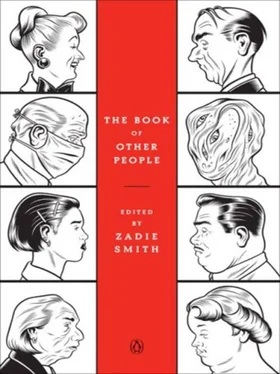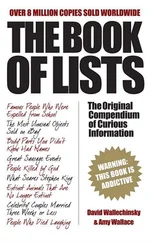He had the waitress refill his gallon-sized Coke, then, as our afternoon turned to evening, washed it all down with black coffee. In our talk, marijuana confusion now gave way to caffeinated jags, like a cloudbank penetrated by buzzing Fokker airplanes. Did I read the New Yorker? This question had a dangerous urgency. It wasn’t any one writer or article he was worried about, but the font. The meaning embedded, at a preconscious level, by the look of the magazine; the seal, as he described it, that the typography and layout put on dialectical thought. According to Perkus, to read the New Yorker was to find that you always already agreed, not with the New Yorker but, much more dismayingly, with yourself . I tried hard to understand. Apparently here was the paranoia Susan Eldred had warned me of: the New Yorker’s font was controlling, perhaps attacking, Perkus Tooth’s mind. To defend himself he frequently retyped their articles and printed them out in simple Courier, an attempt to dissolve the magazine’s oppressive context. Once, I’d entered his apartment to find him on his carpet with a pair of scissors, furiously slicing up and rearranging an issue of the magazine, trying to shatter its spell on his brain. ‘So, how’, he asked me another time, apropos of nothing, ‘does a New Yorker writer become a New Yorker writer?’ The falsely casual ‘so’ masking a pure anxiety. It wasn’t a question with an answer.
But I’m confused in this account, surely. Can we have discussed so much the very first time? The New Yorker, at least. Giuliani’s auctioning 42nd Street to Disney. Mailer on NASA as a bureaucracy stifling dreams. J. Edgar Hoover in the Mafia’s thrall, hyping Reds, instilling self-patrolling fear in the American Mind. In the midst of these variations the theme was always ingeniously and excitingly retrieved. In short, some human freedom had been leveraged from view at the level of consciousness itself.
Liberty had been narrowed, winnowed, amnesiacked. Perkus Tooth used this word without explaining, and in the way that the Mafia itself would: to mean a whack, a rub-out. Everything that mattered most was a victim in this perceptual murder plot. Further: always to blame was everyone; when rounding up the suspects, begin with yourself. Complicity, including his own, was Perkus Tooth’s only doubtless conviction. The worst thing was to be sure you knew what you knew, the mistake the New Yorker ’s font induced. The horizon of everyday life was a mass daydream – below it lay the crucial material, the crux. By now we’d paid for our burgers and returned to his apartment. At his dinette table we sat and he strained some pot for seeds, then rolled another joint. The dope came out of a little plastic box marked with a laser-printed label reading CHRONIC in rainbow colors, a kind of brand name. We smoked the new joint relentlessly to a nub and went on talking, Perkus now free to gesticulate as he hadn’t at Jackson Hole. Yet he never grew florid, never, in all his ferment, hyperventilated or, like some epileptic, bit his tongue. The feverish words were delivered with a merciless cool. Like the cut of his suit, wrinkled though it might be. And the obsessively neat lettering on the VHS tape and on his CDs. Perkus Tooth might have one crazy eye, but it served almost as a warning not to underestimate his scruples, how attentively he measured his listener’s skepticism, making those minute adjustments that were the signature of his or anyone’s sanity – the interpersonal realpolitik of persuasion. The eye was mad and the rest of him was almost steely.
Perkus rifled through his CDs to find a record he wished to play for me, a record I didn’t know – Peter Blegvad’s ‘(Something Else) Is Working Harder’. The song was an angry and incoherent blues, it sounded to me, gnarled with disgruntlement at those who ‘get away with murder’. Then, as if riled by the music, he turned and said, almost savagely, ‘So, I’m not a rock critic, you know.’
‘Okay.’ This was a point I found easy enough to grant.
‘People will say I am, because I wrote for Rolling Stone – but I hardly ever write about music.’ In fact, the broadsides hung in his rooms seemed to be full of references to pop songs, but I hesitated to point out the contradiction.
He seemed to read my mind. ‘Even when I do, I don’t use that language.’
‘Oh.’
‘Those people, the rock critics, I mean – do you want to know what they really are?’
‘Oh, sure – what are they?’
‘Super-high-functioning autistics. Oh, I don’t mean they’re diagnosed or anything. But I diagnose them that way. They’ve got Asperger’s Syndrome. I mean, in the same sense that, say, David Byrne or Al Gore has it. They’re brilliant, but they’re social misfits.’
‘Uh, how do you know?’ As far as I knew, I’d never met anyone with Asperger’s Syndrome, or, for that matter, a rock critic. (Although I had once seen David Byrne at a party.) Yet I knew enough already to find it odd hearing Perkus Tooth denouncing misfits.
‘It’s the way they talk.’ He leaned in close to me, and demonstrated his point as he spoke. ‘They aspirate their vowels nearer to the front of their mouths.’
‘Wow.’
‘And when you see them talking in groups they do it even more. It’s self-reinforcing. Rock critics gather for purposes of mutual consolation, though they’d never call it that. They believe they’re experts.’ Perkus, whether he knew it or not, continued to aspirate his vowels at the front of his mouth as he made his case. ‘They can’t see the forest for the trees.’
‘Thelf-reinforthing exthperts,’ I said, trying it on for size. ‘Can’t thee the foretht for the threes.’ I am by deepest instinct a mimic. Anyway, a VHS tape labeled ECHOLALIA lay on the table between us.
‘That’s right,’ said Perkus seriously. ‘Some of them even whistle when they speak.’
‘Whisthle?’
‘ Exactly.’
‘Thank God we’re not rock critics.’
‘You can say that again.’ He tongued the gum on another joint he’d been assembling, then inspected it for smoke-worthiness, running it under his odd eye as if scanning for a barcode. Satisfied, he ignited it. ‘So, I’m self-medicating,’ he explained. ‘I smoke grass because of the headaches.’
‘Migraine headaches?’
‘ Cluster headaches. It’s a variant of migraine. One side of the head.’ With two fingers he tapped his skull – of course it was his right side, the headaches gravitating toward the deviant eye. ‘They’re called cluster headaches because they come in runs, every day for a week or two at exactly the same time. Like a clock, like a rooster crowing.’
‘That’s crazy.’
‘I know. Also, there’s this visual effect… a blindspot on one side…’ Again, his right hand waved. ‘Like a blot in the center of my visual field.’
A riddle: what do you get when you cross a blindspot with a wandering eye? But we’d never once mentioned his eye, so I hung fire. ‘The pot helps?’ I asked instead.
‘The thing about a migraine-type experience is that it’s like being only half alive. You find yourself walking through this tomb-like world, everything gets far away and kind of dull and dead. Smoking pulls me back into the world, it restores my appetites for food and sex and conversation.’
Well, I had evidence of food and conversation – Perkus Tooth’s appetites in sex were to remain mysterious to me for the time being. This was still the first of the innumerable afternoons and evenings I surrendered to Perkus’s kitchen table, to his smoldering ashtray and pot of scorched coffee, to his ancient CD boombox, which audibly whined as it spun in the silent gap between tracks, to our booth around the corner at Jackson Hole when a fierce craving for burgers and cola came over us, as it often did. Soon enough those days all blurred happily together, for in the disconsolate year of Janice’s broken orbit Perkus Tooth was probably my best friend. I suppose Perkus was the curiosity, I the curiosity-seeker, but he surely added me to his collection as much as the reverse.
Читать дальше












